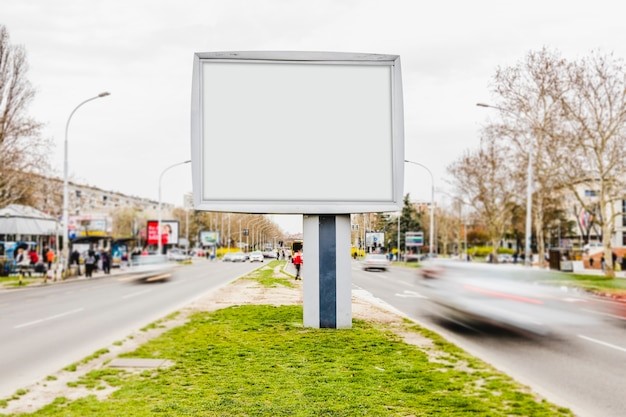Billboard advertising remains one of the most powerful tools in today’s marketing mix, delivering unmatched visibility in high-traffic areas where digital ads can’t always compete. Despite the growth of online and mobile advertising, both local businesses and major consumer brands continue to invest in billboards for their ability to build brand awareness and spark real-world engagement.
In this guide, we’ll break down billboard advertising costs in 2025, including pricing by type, location, and format. You’ll also discover the key factors that influence billboard rates, hidden costs to watch out for, and practical tips to stretch your ad budget. Whether you’re planning a highway billboard or a high-impact digital display in Times Square, this article will equip you with the insights you need to make the right decision.
Average Cost of Billboard Advertising in 2025
Billboard advertising costs in 2025 can vary significantly based on location, format, and visibility. Nationally, businesses might expect to invest anywhere from a few hundred dollars in rural areas to tens of thousands of dollars per month in major metropolitan markets for premium placements.
In rural areas or small towns, prices typically range between $500 and $2,000 monthly, while in mid-sized cities, rates average $2,000 to $8,000. In major metro areas like New York City or Los Angeles, costs can soar to $10,000–$50,000+ per month, especially for high-traffic zones.
For format, static billboards are more affordable, costing $750 to $2,500 per month in most markets. Digital billboards, which allow for dynamic, rotating content, are more expensive, ranging from $1,200 to over $15,000 depending on screen time and location.
A side-by-side comparison of a quick pricing chart can help visualize how billboard costs change between small towns, mid-tier cities, and top-tier markets.
Billboard Advertising Cost by Type
Billboard advertising comes in several formats, each with its own cost structure, features, and impact. Here’s a breakdown of the most common types and what you can expect to pay.
Static Billboards
- Cost Range: Typically $750 to $2,500 per month, depending on location and size
- Rental Duration: Typically rented in 4-week blocks, although other durations may be available
- Additional Costs: Printing the vinyl wrap and installation can add $300–$1,000 upfront
Digital Billboards
- Dynamic Content: Allows rotating ads, animations, and real-time updates
- Cost Range: $1,200 to $15,000+ per month based on location and screen time
- Flexibility: Great for time-sensitive campaigns, multiple creative variations, and dynamic content updates based on factors like time of day (dayparting) or external conditions
Mobile or Truck Billboards
- Cost Range: $250 to $1,500 per day or $1,000 to $7,000 per week, depending on factors like display size, route complexity, and operating hours
- Best Use Case: Highly effective for localized campaigns, events, or targeting foot traffic in dense areas
- Bonus: Often includes driver, fuel, and route customization
3D or Custom Billboard Designs
- Cost Range: Starts at $10,000 and can exceed $100,000 depending on the complexity of the design, materials used (e.g., simple extensions vs. elaborate kinetic sculptures), and installation requirements
- Features: Includes sculptural elements, lighting, and motion for maximum visibility
- Use Case: Ideal for major brand launches or viral marketing campaigns
Factors That Affect Billboard Advertising Costs
Several factors influence how much billboard advertising costs. Location and traffic volume play a major role, billboards in high-traffic areas like Times Square command much higher rates than those along rural highways. Billboard size and visibility also impact pricing, with larger, more prominent displays costing more.
The duration of the ad campaign matters too. Longer rentals often come with discounted rates. Design complexity and production costs can add to your expenses, especially for custom 3D or illuminated billboards. Seasonal demand also spikes costs; holidays, elections, and major events tend to drive up prices. Lastly, local regulations and permitting fees vary by city and can increase the total investment depending on billboard zoning laws.
Billboard Costs by Location (2025 Estimates)
Billboard advertising costs vary significantly depending on the city and traffic volume. In New York City, premium locations like Times Square can cost between $10,000 and $50,000 per month. Los Angeles rates are slightly lower, typically ranging from $5,000 to $25,000 per month, depending on the area’s visibility. In Chicago, businesses can expect to pay around $3,000 to $15,000 monthly.
For smaller cities and rural areas, billboard costs are much more affordable, usually falling between $500 and $2,000 per month. The higher the foot and vehicle traffic, the higher the billboard price. A table comparison of high-traffic vs. low-traffic areas can help businesses better estimate their budget needs.
Hidden or Additional Costs to Consider
When budgeting for billboard advertising, it’s important to factor in hidden or extra costs beyond the rental fee. Printing and vinyl production fees for static billboards can add several hundred dollars to your campaign, depending on size and materials. If you don’t have an in-house creative team, you may also need to pay for billboard design services, which can vary based on complexity and turnaround time.
Installation and takedown charges are sometimes billed separately, especially for custom or large-format boards. If you work with an advertising agency or broker to secure billboard space, expect to pay service fees or commissions. These extras can quickly add up, so planning ahead ensures you avoid unexpected expenses.
Is Billboard Advertising Worth the Cost?
Billboard advertising can be surprisingly cost-effective, especially when comparing the cost-per-thousand impressions (CPM) to digital ads. While digital platforms offer precise audience targeting, billboards provide broad, unavoidable real-world exposure to a wide audience, unaffected by ad blockers or scrolling fatigue.
Small and mid-sized businesses have reported strong ROI when targeting local audiences, especially for events, store openings, or regional services. In many cases, a well-placed billboard can drive significant foot traffic or brand awareness that digital campaigns struggle to match.
Billboards tend to outperform online ads for local visibility, creating lasting impressions among commuters. However, success largely depends on location, creative messaging, and campaign timing.
Pros and Cons of Billboard Advertising
Billboard advertising can be a powerful marketing tool, but like any medium, it comes with both advantages and limitations. Here’s a breakdown of the key pros and cons:
Pros:
- Wide Reach: Billboards can expose your message to thousands of people daily, especially when placed in high-traffic areas.
- High Visibility: Large, eye-catching designs placed strategically can grab attention and boost brand recognition.
- 24/7 Brand Exposure: Unlike digital ads, billboards are always visible, offering continuous presence and reinforcing your message over time.
- Geo-Targeting: Carefully placed billboards can help target specific geographic areas or commuter routes relevant to your audience.
Cons:
- Limited Messaging Space: Due to brief exposure time, billboard ads must be short and simple, ideal for branding, but not detailed messaging.
- Costly Investment: Premium locations and larger formats can come with high price tags, making it less accessible for small businesses.
- Difficult to Measure ROI: It’s challenging to directly track conversions or engagement, unlike online ads that offer detailed analytics.
- Low Flexibility: Once printed or installed, making changes can be time-consuming and costly, especially for static billboards.
Tips to Get the Best Value from Billboard Advertising
To get the most out of your billboard budget, start by negotiating rates, especially if you’re advertising during off-peak seasons or committing to multiple months. Many billboard owners are open to discounted deals if space is available last-minute or if you’re bundling locations.
Choosing the right location and format is equally important. High-traffic areas provide more impressions but come at a premium, so weigh visibility against budget. Consider static billboards for long-term branding and digital formats for time-sensitive or rotating messages.
To measure performance, include clear and appropriately sized QR codes or short, memorable custom URLs that lead to dedicated landing pages. Consider the speed of traffic when designing QR code placement. This lets you track engagement and ROI more precisely. Consider short-term campaigns or rotating placements to test different markets before locking in a long-term commitment.
Where to Buy or Rent Billboard Space
You can rent billboard space directly from major billboard companies like Lamar Advertising, Clear Channel Outdoor, or Outfront Media. These providers offer access to thousands of billboard locations across the U.S., with varying formats like static, digital, and transit ads.
Alternatively, you can use ad marketplaces or programmatic platforms like Blip or AdQuick, which allow you to book billboard space online with greater flexibility. These platforms often show pricing, availability, and audience metrics in real-time, making it easier for small businesses or marketers to plan campaigns.
Working directly with a billboard company may give you better rates for long-term buys and access to premium locations. However, agencies or ad tech platforms can save time, offer broader inventory, and provide tools for campaign tracking, though they may include extra fees.
FAQ – Billboard Advertising Costs
Got questions about billboard advertising costs? Below are answers to some of the most common concerns to help you plan your next outdoor ad campaign wisely.
Conclusion
Billboard advertising costs can vary widely, from a few hundred dollars to tens of thousands per month, depending on location, format, and duration. Key factors such as traffic volume, city size, and ad type play a major role in determining pricing. To decide if billboards are right for your business, evaluate your goals, budget, and the importance of brand visibility. A smart approach is to plan carefully, compare options, and start with a test campaign to measure ROI before committing to a larger investment.
 Sections of this topic
Sections of this topic
















